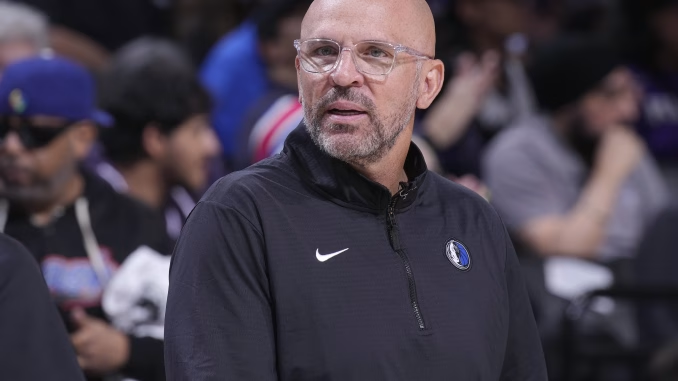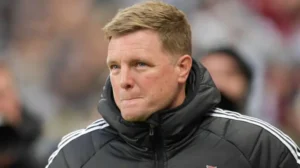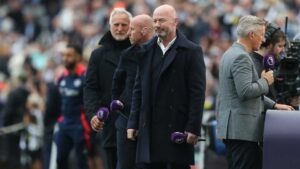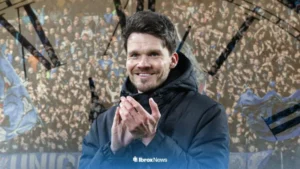
Dallas Mavericks Reportedly Refuse to Grant New York Knicks Permission to Interview Jason Kidd for Their Head Coaching Vacancy
In the ever-evolving landscape of NBA coaching vacancies and personnel moves, one story that has recently captured attention involves the Dallas Mavericks and their reported refusal to allow the New York Knicks to interview Jason Kidd for their open head coaching position. This development highlights the complexities of NBA coaching hires, the value franchises place on their coaching staff, and the strategic maneuvers teams undertake to maintain control over their talent. Let’s dive into the background, implications, and potential outcomes surrounding this notable refusal.
Jason Kidd, a Hall of Fame player turned respected NBA coach and assistant, currently serves as an assistant coach for the Dallas Mavericks. Since transitioning from playing to coaching, Kidd has earned a reputation as a sharp basketball mind with a deep understanding of both offense and defense, as well as player development. His coaching journey has included head coaching stints with the Brooklyn Nets, Milwaukee Bucks, and briefly the Mavericks themselves before stepping into his current assistant role.
The Mavericks have relied on Kidd’s expertise in helping develop their roster, including guiding their young core alongside franchise star Luka Dončić. Kidd’s experience and rapport with players make him a valuable asset to Dallas, which is why the team’s decision to deny the Knicks permission to interview him is significant.
The New York Knicks, one of the NBA’s most storied franchises, have recently found themselves searching for a new head coach following the departure of their previous coach. The Knicks have been aiming to rebuild and reestablish themselves as a competitive team in the Eastern Conference. With a young roster led by promising talent like Julius Randle and RJ Barrett, the front office is eager to find a head coach who can elevate the team’s performance and bring a winning culture back to Madison Square Garden.
Jason Kidd’s name emerged as a leading candidate for the Knicks’ vacancy due to his extensive coaching experience and ability to develop players. The Knicks reportedly expressed interest in interviewing Kidd, hoping his basketball acumen could align with their vision for the franchise.
In the NBA, when a team wants to hire a coach who is currently under contract with another team in a coaching capacity (whether head coach or assistant), they typically need to request permission from the current team to interview that coach for a vacancy. This is a courtesy and contractual practice designed to manage coaching movement and respect organizational continuity.
The Mavericks’ reported refusal to grant permission to the Knicks to interview Jason Kidd signals how highly Dallas values Kidd and his contributions. There are several reasons why the Mavericks might have made this decision:
- Retaining Coaching Talent: Kidd is a critical part of the Mavericks’ coaching staff. Allowing him to leave for a head coaching role elsewhere would create a gap that might be difficult to fill, especially mid-season or during a pivotal period of the team’s development.
- Protecting Team Stability: The Mavericks may believe Kidd’s departure could disrupt team chemistry or slow down the progress being made with young players. Maintaining continuity on the coaching staff is often vital for player growth and consistent game strategies.
- Long-Term Plans: Dallas might have long-term plans for Kidd beyond his assistant role. They could be grooming him for future leadership positions within the organization, making it less appealing to lose him to another team.
- Negotiation Leverage: By denying permission, the Mavericks may be signaling to other teams that Kidd is a valued asset not easily available, potentially increasing their negotiating power in trade discussions or future coaching hires.
For the Knicks, the Mavericks’ refusal presents a challenge. They must now decide how to proceed in their coaching search without the opportunity to formally interview Kidd. The Knicks have a few options moving forward:
- Respect the Decision and Look Elsewhere: The Knicks could accept the Mavericks’ stance and focus on other coaching candidates, whether assistants from other teams, former head coaches, or promising up-and-coming coaching talents.
- Attempt to Negotiate: The Knicks’ front office might engage in discussions with the Mavericks to try and secure permission through negotiations, potentially offering compensation such as draft picks or cash considerations.
- Wait for Contract Expiry: If Kidd’s contract or obligations with the Mavericks expire soon, the Knicks could plan to revisit their interest later without needing formal permission.
- Consider Internal Candidates: The Knicks might also consider promoting from within their current staff if the external options become limited.
This incident highlights a broader theme in the NBA: the control that franchises exert over coaching personnel and the often intricate negotiations involved in coaching hires. Unlike player trades, which have well-defined rules and compensation mechanisms, coaching hires involve a mix of courtesy requests, contractual obligations, and strategic decisions.
Teams frequently have to balance the desire to poach coaching talent with the realities of respecting other organizations’ rights and maintaining good relationships across the league. Denials like this one, while not common, do happen when a franchise views a coach as indispensable.
Jason Kidd’s coaching career remains promising despite the setback with the Knicks’ interview denial. Known for his basketball IQ and leadership skills, Kidd is widely expected to secure a head coaching role in the near future if he desires one. He has demonstrated his ability to manage rosters, implement strategies, and develop young talent.
Whether with the Mavericks or another team, Kidd’s coaching journey will be closely watched. His experience as a player and coach gives him unique insight into the modern NBA, making him an attractive candidate for teams seeking to blend veteran leadership with youthful energy.
Keeping Kidd on staff could have a positive effect on the Mavericks’ current and future seasons. As the team navigates the challenges of competing in a highly competitive Western Conference, the presence of an experienced coach like Kidd is invaluable. His ability to assist in game planning, player development, and in-game adjustments can contribute significantly to the team’s success.
Additionally, retaining Kidd could enhance the Mavericks’ appeal to free agents and draft prospects who value strong coaching staffs and player development opportunities.
The reported decision by the Dallas Mavericks to deny the New York Knicks permission to interview Jason Kidd for their head coaching vacancy underscores the complexities of NBA coaching hires and the strategic importance teams place on coaching personnel. For the Mavericks, Kidd is a critical asset they are unwilling to lose at this time. For the Knicks, this refusal is a setback but not the end of their coaching search.
As the coaching carousel continues to turn, fans and analysts alike will be watching closely to see where Kidd lands next, whether he remains with Dallas or eventually moves on to a head coaching opportunity elsewhere. This story also serves as a reminder of the behind-the-scenes negotiations and decisions that shape the future of NBA teams beyond just player transactions.







